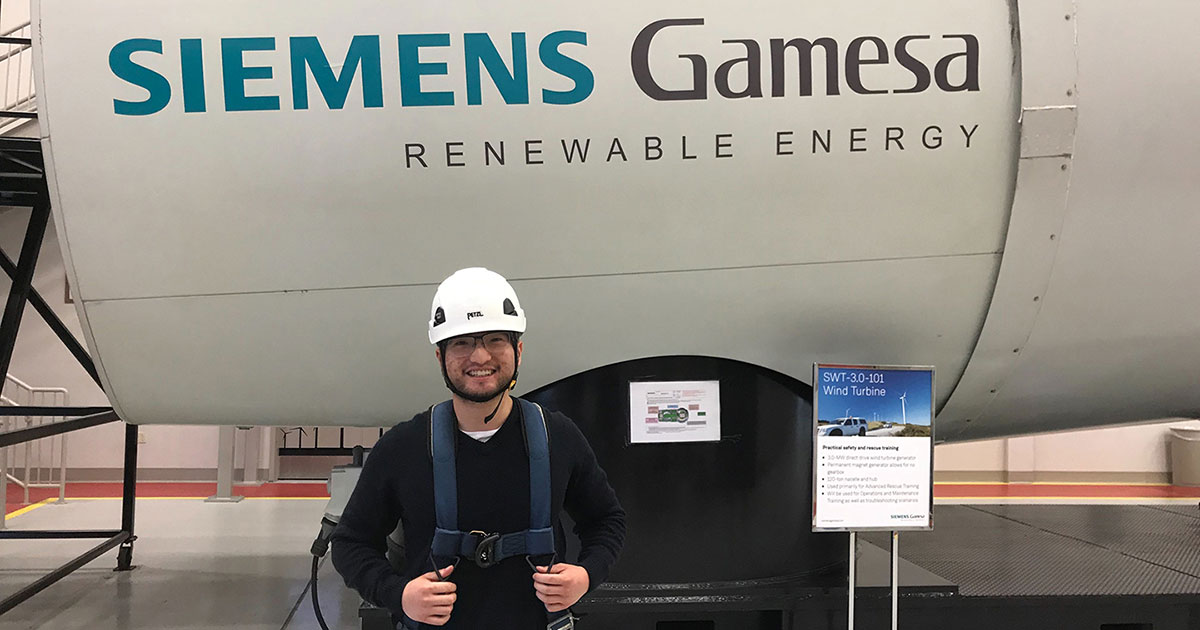One Student Entrepreneur’s Virtual Reality

Innovators must know when to pivot. Market demand, funding, and barriers to entry are all critical factors in determining whether one business may prosper while another may plummet.
Eagle Wu ’20 has experienced both sides firsthand.
As founder of virtual reality company Vinci, Wu has pivoted his business model across industries—from architecture to military and renewable energy. He has seized the opportunities in front of him, and, in turn, put the business in its best position to succeed.
Changing Course
Vinci was originally focused on virtual reality for architecture and design, but the decision to veer off course was made due to circumstance.
“For us, it seemed like the entry into the (architecture) market was way too high,” Wu said.
In flew the Air Force.
Last year, Vinci received a $1 million contract with the Air Force to use virtual reality to train aircraft maintainers. The company also is working to create a safety equipment prototype for the wind turbine division of Siemens Gamesa Renewable Energy as part of a research partnership.
With minimal time for physical training situations and a lack of access to instructional aircraft, Vinci has allowed members of the Air Force to train while they ready for their next assignment.
And, even with the significance of the arrangement, Wu still revels in the reach and impact of his company.
“The product I’m building will be out in the world in these live missions,” he said, adding that he recently worked with units that just returned from a stint in the Middle East and Africa. “It’s intense.”
Wu’s renewable energy work led him to a guest appearance on Bill Nye’s podcast, where the two discussed clean energy and new technology approaches, and the advantages of approaching renewable energy from a holistic point of view.
While continuing contract work, the Vinci team also is building an interface that will allow clients to create their own virtual reality simulations, saving money for entities, such as the military, that frequently change their curriculum.
“Because of that high turnover, it becomes infeasible for them to service out development,” Wu said. “We’re building a platform that allows them to do it themselves, and also allows us to scale to more clients.”
In May 2020, Vinci was featured as one of 25 businesses in TechCrunch’s inaugural Liftoff List, where student entrepreneurs submit their ventures for a chance at $100,000 in funding.
Finishing What He Started
Wu left Babson College for a year and a half to focus on Vinci. He returned this fall with the goal of finishing his coursework while continuing to run the business.
“I felt like there were classes at Babson I was missing out on. There are things I do want to learn that I probably won’t have the opportunity to learn had I dropped out.”
Eagle Wu '20
Taking classes in finance and economics has better positioned himself as an entrepreneur, he said.
“At some point, that is something we have to (know.) It’s better to have that knowledge,” Wu said. “When you start scaling up contract sizes, they start to scrutinize every part of your business, including my credentials.
“If I’m trying to pitch for a $10 million (or) $20 million contact, and I go in and they look at my background and say ‘this guy only has a high school diploma,’ they’re going to take note of that. Having a degree matters.”




